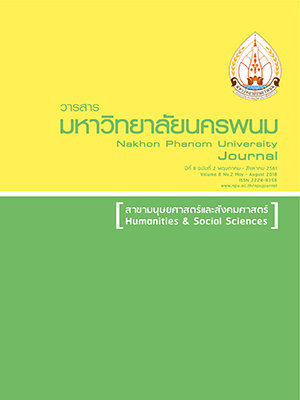รูปแบบความสัมพันธ์เชิงสาเหตุของปัจจัยที่ส่งผลต่อทักษะชีวิตนักเรียนในโรงเรียน สังกัดสำนักงานเขตพื้นที่การศึกษาประถมศึกษา ในภาคตะวันออกเฉียงเหนือ
Main Article Content
Abstract
The objectives of this study were: 1) to develop a causal relationship model of factors influencing student life skills, and 2) to verify the causal relationship model of factors influencing student life skills in schools under the Offices of Primary Education Service Areas in the Northeast of Thailand with the empirical data. The study was divided into 2 phases. The first phase was determining the conceptual framework of research, consisting of analyzing documents and related research, interviewing experts and studying the outstanding schools. The second phase was examining the research hypotheses. Data were collected using a rating scale questionnaire. Samples were school administrators, guidance teachers, and classroom teachers in schools under the Offices of Primary Education Service Areas in the Northeast of Thailand, totaling 426 people. Data analysis was done using statistics of frequency, percentage, mean, standard deviation, Pearson’s product moment correlation coefficient and the LISREL software in analysis of confirmatory factors and examination of goodness-of-fit between the hypothesized model and the empirical data.
The findings were as follows: 1) the causal relationship model of factors influencing student life skills in schools under the Offices of Primary Education Service Areas in the Northeast of Thailand comprised the influence of friends group, parenting, classroom atmosphere, students’ self-concepts, and achievement motivation. As for the student life skills, they consisted of awareness and self-esteem, decision making and problem solving, management of emotion and stress, and creating good relationships with others; 2) the developed model had consistency with the empirical data. Students’ self- concepts had the highest direct influence on student life skills, followed by atmosphere in classroom, students’ achievement motivation, influence of friends group. Atmosphere in classroom had the highest influence on student life skills, followed by students’ self-concepts, achievement motivation, influence of friends group, and parenting. The above factors could jointly explain 79 percent of student life skills.
Article Details
References
. (2554). แนวทางการพัฒนาทักษะชีวิตบูรณาการการเรียนการสอน 8 กลุ่มสาระการเรียนรู้ หลักสูตรแกนกลางการศึกษาขั้นพื้นฐาน พุทธศักราช 2551. กรุงเทพฯ : ชุมนุมสหกรณ์การเกษตรแห่ง
ประเทศไทย.
ชมรมจิตแพทย์เด็กและวัยรุ่นแห่งประเทศไทย. (2548). คู่มือการเลี้ยงลูก. สืบค้นเมื่อ กันยายน 2560, จาก https://www. rcpsycht.org/cap/book04_4.php.
ทิศนา แขมมณี. (2553). ศาสตร์การสอนองค์ความรู้เพื่อการจัดกระบวนการเรียนรู้ที่มีประสิทธิภาพ. กรุงเทพฯ : จุฬาลงกรณ์มหาวิทยาลัย.
บุญชม ศรีสะอาด. (2554). การวิจัยเบื้องต้น. พิมพ์ครั้งที่ 10. กรุงเทพฯ : สุวีริยาสาส์น.
ภรนุชนาฏ อรรถาเวช. (2556). การพัฒนารายวิชาที่เสริมภาษาอังกฤษโดยใช้สื่อประสมเพื่อเสริมสร้างความสามารถทางภาษาและแรงจูงใจของนักศึกษา มหาวิทยาลัยเทคโนโลยีราชมงคลสุวรรณภูมิ. วิทยานิพนธ์ปริญญาดุษฎีบัณฑิต. กรุงเทพฯ : มหาวิทยาลัยศิลปากร.
มติชนออนไลน์. (2560). เด็กไทยวันนี้ นักวิชาการจุฬาฯ แฉสถานการณ์เด็กไทยมีปัจจัยเสี่ยง ความรุนแรง แม่วัยใส ยาเสพติด สืบค้นเมื่อ สิงหาคม 2556, จาก https://www.matichon.co.th/news/418603.
ยงยุทธ วงศ์ภิรมย์ศานติ์ และ สุวรรณา เรืองกาญจนเศรษฐ์. (2553). ทักษะชีวิต. กรุงเทพฯ : สำนักงานกองทุนสนับสนุนการสร้างเสริมสุขภาพ (สสส.).
รังสรรค์ โฉมยา. (2552). รวมศัพท์ที่สำคัญทางจิตวิทยา. มหาสารคาม : มหาวิทยาลัยมหาสารคาม.
ลักขณา สิริวัฒน์. (2549). จิตวิทยาในชีวิตประจำวัน. กรุงเทพฯ : โอเดียนสโตร์.
วราภรณ์ ตระกูลสฤษดิ์. (2552). จิตวิทยาการปรับตัว. พิมพ์ครั้งที่ 4. กรุงเทพฯ : ส่งเสริมวิชาการ.
สมพงษ์ จิตระดับ. (2556). รายงานการวิจัย โครงการพัฒนาสมรรถนะระบบที่ปรึกษาให้สภาเด็กและเยาวชนในประเทศไทย สืบค้นเมื่อ สิงหาคม 2556, จาก https://dcy.go.th/webnew/upload/download/file_th_20152411004218_1.pdf.
สมศรี ประเสริฐวงษ์. (2541). การอบรมและเลี้ยงดูเด็ก.กรุงเทพฯ : มหาวิทยาลัยรามคำแหง.
สำนักงานคณะกรรมการการศึกษาขั้นพื้นฐาน. (2558). แนวทางการจัดค่ายเสริมสร้างทักษะชีวิต : ปัญหาหยุดยั้งด้วยพลังเด็กและเยาวชน. สืบค้นเมื่อ สิงหาคม 2559, จาก https://promote.nma6.go.th/wp-content/uploads/2016/05/ skills-camp.pdf
สุทธิชัย ผ่านสุวรรณ. (2559, กันยายน - ธันวาคม). รูปแบบความสัมพันธ์เชิงสาเหตุของปัจจัยคุณภาพครูที่ส่งผลต่อคุณลักษณะของนักเรียนในช่วงต้นของศตวรรษที่ 21. วารสารมหาวิทยาลัยนครพนม, 6(3) 67 – 74.
Bandura, A. (1986). Social foundations of thought and action: A social cognitive theory. Englewood Cliffs, NJ : Prentice-Hall.
Bellanca, J., & Brandt, R. (2010). 21st century skills : Rethinking how students learn, Bloomington, United State of America, Solution Tree Press.
Claire, C., & Solveig, A. (2013). Influence of friends on children’s physical activity. American Public Health Association . American Journal of public health, 103(7): e23-e38.
Emily, N. & Ronald, J. (2016). Interventions to address parenting and parental substance abuse: Conceptual and methodological considerations. Journal of HHS Public Access, 39: 71-82.
Kabeer, S., & Mona El-Nady, T. (2016). Relationship between academic self-concept and students’ performance among school age children. American Journal of Nursing Science, 5(6): 295-302.
Maxwell, R. (1981). Life after school: A social skills curriculum. New York : Pregamon International Library.
McClelland, D. C. (1953). The achievement motive. New York : Appletion Century Crotts.Inc.
Roger, D. (1969). Issue in adolescent psychology. New York : Mcredith Cooperation.


